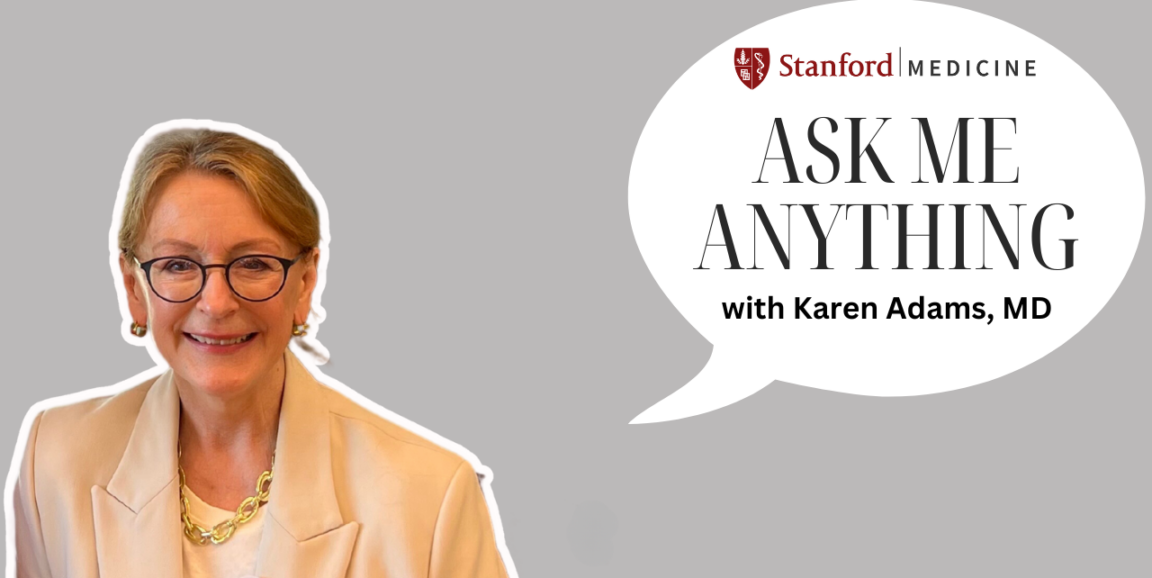Karen Adams, MD, clinical professor of obstetrics and gynecology, has a message for the half of the population that goes through menopause: It shouldn't be taboo, and you don't have to suffer. In an Ask Me Anything, Adams, a menopause expert, answers a range of questions, explaining the basics of menopause, how to treat symptoms, when to go to your doctor if symptoms persist and how to soften the burden of an oft-dreaded phase of life.
The below Q&A has been edited for clarity and length.
Let's start simple. What is menopause? What is perimenopause?
The definition of menopause is not having had a period for a year. The average age at which that happens is about 51. It's pretty rare to be having periods at 55. The time leading up to menopause, when symptoms start, is known as perimenopause.
Menopause isn't like flipping a light switch. It's not like you're having periods every month and then boom, it stops. When you get a period every month, that's a sign that your brain is talking to your ovaries and they're responding by making hormones. As you get into perimenopause, the aging ovaries respond less and less to those brain signals. The brain is still talking to the ovaries, but the ovaries are like, "Nah, I'm not doing it." Then, sometimes they wake up and have a little hormone surge, which is when you might have a period, you might not, you might feel normal, you might not. Your hormones are not cycling in any kind of a predictable way anymore. Perimenopause, on average, lasts about four years, but it can stretch to 10 years.
What are the symptoms of menopause?
The No. 1 symptom is hot flashes and night sweats -- 80% of women who go through menopause get those. You might flush red in your face, and you can feel your heart rate speed up during a hot flash. It can almost feel like a panic attack sometimes. It's incredibly uncomfortable. People also experience mood swings, insomnia, and sometimes heavy or irregular bleeding.
What are treatments for menopausal symptoms like hot flashes or night sweating?
The good news: Taking estrogen can reduce hot flashes in about three to four weeks. It may not completely suppress them, but it can lower the symptoms severity by 80% or 90%. There are other hormone therapies -- typically two hormones, estrogen and progesterone. You can take these together to boost heart and bone health, manage symptoms, and provide other benefits.
Are hormones safe?
Unfortunately, hormone therapy has had the worst PR campaign. People are terrified of it. The messaging has been very negative for so long, but over the past five or six years, we've really refined our knowledge of this treatment, and we now know that hormone treatment can be safe and effective for many women. We realize now that all those negative messages didn't need to be so negative.
Are there non-hormonal treatments?
Absolutely. There are a couple of classes of drugs, including selective serotonin reuptake inhibitors, which are antidepressants. Those can be used to treat hot flashes. There are also behavior-based treatments, such as cognitive behavior therapy. I think everyone should do it. It's such a powerful tool for treating insomnia, anxiety and depression, and menopausal symptoms overall. In our Menopause and Health Aging program at Stanford Medicine, we have experts in cognitive behavior therapy and that's probably the single most important aspect of managing your symptoms. Cognitive behavioral therapy provides a toolkit for managing the thoughts that torture you -- and those often contribute to insomnia. We all get cognitive distortions, but this therapy teaches you to identify those thoughts and reframe them in a way that's much kinder to ourselves. This type of therapy can be a great option for menopausal people who are seeking help dealing with mental impacts of the change. I think it's an important message that treatments are not just drugs.
At what point do you go see your doctor if you have concerning symptoms, such as irregular bleeding?
If your periods are stretching out and you're skipping some, that's normal. It may not be comfortable, but it's normal. If, however, you're having frequent bleeding, if you're having prolonged bleeding, if you're bleeding 10 days or 15 days, if you're bleeding every other week, or you're bleeding more than 50% of the time, you should see a doctor because that is probably not just hormonal.
What kind of skincare routine should we have during menopause?
Aging skin is really from long-term sun exposure, so always wear sunscreen. But there are estrogen receptors on collagen fibers, so after menopause there's also a loss of collagen. We don't prescribe estrogen just for skincare reasons, but when we prescribe it for hot flashes or for vaginal discomfort it has other ripple effects, such as improving moisture and flexibility in the skin. Some people also like retinoids.
What can employers do to help employees who are going through this?
It's beneficial to employers to provide support for their employees who are going through the menopause process. Uncontrolled hot flashes and menopausal symptoms are a cause of work absenteeism and decreased productivity. Fans and adjustable thermostats help, and employers should consider cognitive behavior therapy employee assistance programs.
What is your best piece of advice to those who will or are going through it?
If you aren't feeling symptoms, that's great - you're in that 20% who don't experience symptoms. You should still talk to your provider about maximizing your health. If you are feeling it, however, there are so many good, reasonable, accessible treatments -- and people who know how to treat it. Seek out a certified menopause expert. The North American Menopause Society certifies experts, and you can go to that website, put in your ZIP code and find someone who's informed. You should feel empowered to seek the find the answers that you need.
Why is menopause such a taboo subject?
As a menopause expert, I talk about it all day long, every day. I think part of it is cultural and generational. Some of it might be that people don't want to admit they're aging. But I'm here to tell you that it's great on the other side of menopause. I think that message is finally getting out there, that it's wonderful to be postmenopausal.
Photo by Margarita Gallardo
For more Ask Me Anything content, visit our related Scope stories.






